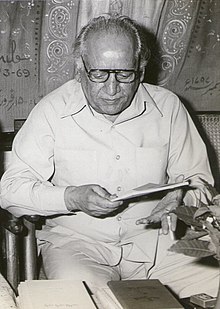Faiz Ahmad Faiz | |
|---|---|
فیض احمد فیض | |
 | |
| Pronunciation | [fɛːz ɛɦ.məd̪ fɛːz] |
| Born | 13 February 1911 |
| Died | 20 November 1984 (aged 73) |
| Resting place | Model Town Graveyard, Lahore |
| Nationality |
|
| Education | Arabic literature (B.A., M.A.) English literature (M.A.) |
| Alma mater | |
| Occupations | |
| Years active | 1935–1984 |
| Works | Bibliography |
| Political party | Communist Party of Pakistan |
| Criminal charges | Rawalpindi conspiracy |
| Criminal penalty | 4-year imprisonment |
| Spouse | |
| Children | |
| Relatives | Shoaib Hashmi (son-in-law) |
| Awards |
|
| Writing career | |
| Language | |
| Genre | |
| Subject | |
| Literary movement | Progressive Writers' Movement |
| Notable works |
|
| Military career | |
| Allegiance | |
| Service | |
| Years of service | 1942–1947 |
| Rank | |
| Unit | 18 Garhwal Rifles |
| Battles / wars | World War II |
| Awards | |
| Website | faizfoundationtrust |
| Signature | |
 | |
| Part of a series on |
| Progressive Writers' Movement |
|---|
Faiz Ahmad Faiz[a] MBE NI (13 February 1911 – 20 November 1984)[2] was a Pakistani poet and author of Punjabi and Urdu literature. Faiz was one of the most celebrated, popular, and influential Urdu writers of his time, and his works and ideas remain widely influential in Pakistan and beyond.[3] Outside of literature, he has been described as "a man of wide experience", having worked as a teacher, military officer, journalist, trade unionist, and broadcaster.[4]
Born in Faiz Nagar, British Punjab(now in Narowal District), Faiz studied at Government College and Oriental College[5] in Lahore[5] and went on to serve in the British Indian Army. After the Partition of India, Faiz served as editor-in-chief of two major newspapers — the English language daily Pakistan Times and the Urdu daily Imroze.[6][7] He was also a leading member of the Communist Party before his arrest and imprisonment in 1951 for his alleged part in a conspiracy to overthrow the Liaquat administration and replace it with a left-wing, pro-Soviet government.[8]
Faiz was released after four years in prison and spent time in Moscow and London, becoming a notable member of the Progressive Writers' Movement. After the downfall of military dictator Ayub Khan's government, and the Independence of Bangladesh, he worked as an aide to Zulfikar Ali Bhutto, but exiled himself to Beirut after Bhutto's execution at the hands of another military dictator Zia ul-Haq.[8]
Faiz was a well-known Marxist and is said to have been "a progressive who remained faithful to Marxism."[9] Critics have noted that Faiz took the tenets of Marxism where Muhammad Iqbal had left it, and relayed it to a younger generation of Muslims who were considered more open to change, more receptive to egalitarianism, and had a greater concern for the poor.[10] Literary critic Fateh Muhammad Malik argues that while initially Faiz was more of a secular Marxist he eventually subscribed to Islamic socialism as his life progressed, as his poems getting more religious in tone over the years demonstrate, even suggesting that Faiz ultimately aimed for an Islamic revolution, having endorsed the 1979 Iranian revolution.[11]
Faiz was the first Asian poet to be awarded the Lenin Peace Prize (1962)[12] by the Soviet Union and was also nominated for the Nobel Prize in literature.[13] He was posthumously honoured when the Pakistan Government conferred upon him the nation's highest civil award — the Nishan-e-Imtiaz — in 1990.[13][14]
- ^ a b Cite error: The named reference
aajwas invoked but never defined (see the help page). - ^ "The Life of Faiz Ahmed Faiz – Newsweek Pakistan". 26 August 2022. Retrieved 11 February 2023.
- ^ "Faiz Ahmad Faiz could be 20th century's most relevant poet, here are a few shayaris that will tug at your heart strings". Hindustan Times. 3 January 2020. Retrieved 12 February 2023.
- ^ Sisir Kumar Das, History of Indian Literature: 1911-1956, struggle for freedom : triumph and tragedy, Sahitya Akademi, 2005, p. 476
- ^ a b Faiz, Faiz Ahmed (3 January 2007). "Faiz Ahmed Faiz". Faiz Ahmed Faiz. Archived from the original on 2 September 2017. Retrieved 8 December 2017.
- ^ "Of Faiz and army generals | Political Economy | thenews.com.pk". www.thenews.com.pk. Retrieved 11 February 2023.
- ^ Farooqi, Baran (13 June 2017). "Between Patriotism, Partition and Pakistan, here's how Faiz Ahmed Faiz became a poet". Scroll.in. Retrieved 13 February 2023.
- ^ a b Dryland, Estelle (1992). "Faiz Ahmed Faiz and the Rawalpindi Conspiracy Case". Journal of South Asian Literature. 27 (2): 175–185. JSTOR 40874124.
- ^ "REVIEW: Faiz Ahmed Faiz: Dard aur Darma ka Sha'er by Dr Mohammad Ali Siddiqui". Dawn.com. 12 August 2012. Retrieved 12 February 2023.
- ^ Jalil, Rakhshanda (16 January 2020). "What Makes Faiz Timeless and Accessible to Lay Urdu Readers?". TheQuint. Retrieved 13 February 2023.
- ^ Nayyar, Nasir Abbas (17 November 2019). "Faiz's notion of a revolution". The News International. Retrieved 11 June 2023.
- ^ "Verses of Urdu poet Faiz Ahmed Faiz dropped from CBSE Class 10 textbook: Report". Scroll.in. 23 April 2022. Retrieved 13 February 2023.
- ^ a b "Remembering legendary poet Faiz Ahmed Faiz on 35th death anniversary". Daily Times. 22 November 2019. Retrieved 11 February 2023.
- ^ "Faiz Ahmed Faiz: Life and poetry". Dawn. 17 February 2011. Archived from the original on 8 December 2017. Retrieved 8 December 2017.
Cite error: There are <ref group=lower-alpha> tags or {{efn}} templates on this page, but the references will not show without a {{reflist|group=lower-alpha}} template or {{notelist}} template (see the help page).